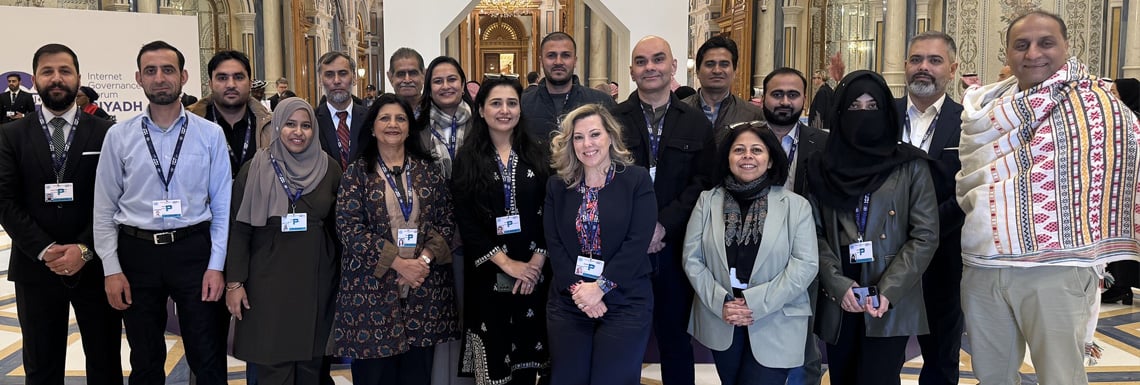Perhaps the greatest beauty of the Internet is in its promise of connection. Bridging distances that once seemed unsurmountable, pulsating with opportunities for creativity, and amplifying the mosaic of expression – the Internet at its very heart, is human.
And that is what we, as the team from the APNIC Foundation, felt most keenly as we attended the Internet Governance Forum in Riyadh in December 2024.
Together, the Foundation team comprised of 22 people from various economies in the region with a focus on South Asia, and hosted five sessions at the IGF – probably a record number by a single organization in the recent history of the Forum. Through the week, our sessions and interventions highlighted infrastructure gaps, the need for connectivity, hindrances in meaningful access in as much as refocusing attention on communities that run the risk of being forgotten, hailing unsung heroes that keep the Internet’s infrastructure running, and bringing into focus people that stand to be the most affected by widening digital divides.
On Day 0, we gathered to hear first-hand accounts of Afghan women who spoke to barriers to education due to limited connectivity and access, and the central role played by the Internet to overcome these obstacles. Participants discussed the need to maintain global attention on Afghan women. We brainstormed the need for a multistakeholder action plan for improving Internet access and digital literacy for Afghan women, based on partnerships with local and international organizations to ensure scalability and long-term impact.
Our next session focused on multifaceted challenges hindering Internet connectivity in the developing world and actionable strategies to address them. The Asia-Pacific is home to the greatest number of unconnected people, standing at about 1.92 billion. The session speakers emphasised the need for targeted investment in underserved areas, including small island states; collaborative partnerships to mobilise resources, share expertise, and implement and scale connectivity solutions; and fostering supportive policy and regulatory environments that drive meaningful progress toward universal access to the Internet.
The same afternoon, the Foundation assembled various actors to address barriers faced by women that hinder their participation in the tech industry and Internet development – the basis for our Switch! project. The session benefited from an all-female speaker line-up, who shared personal reflections pointing toward systemic, intersectional issues that obstruct meaningful participation by women in the industry. The group called stakeholders to action – to implement legislation that by design upholds and furthers women’s rights and gender equality; to foster collaboration between governments and the industry to offer mentorship to women and create opportunities for growth; as well as shift industry norms toward inclusive work cultures, and policies that encourage equality, value diversity, and accommodates the needs of women with children.
Yet another session organized by the Foundation (and for the very first time at the IGF) heard from the tireless folks working behind-the-scenes to run and maintain the Internet’s infrastructure – members of NOGs, or Network Operators Group. The APNIC Foundation convened representatives from SANOG, MENOG, RIPE NCC, as well as upcoming NOGs in Maldives, Afghanistan, and Pakistan. The group’s rich discussion took note of the role played by this technical group, and the need to share best practices between NOGs, strengthen regional and cross-NOG collaboration, foster community-driven solutions, create opportunities for stakeholder engagement, and mobilise funding. Most pertinently, there was consensus to create more alignment between technical and policy-oriented conversations within the Internet governance space.
One of the Foundation’s most effective interventions at the IGF 2024 was the role we played in convening actors from the donor community for a conversation focused on the issues, gaps, and challenges in Internet and digital development in APAC. Representatives of international organizations, multilateral banks, national governments, development agencies, and philanthropic organizations discussed the need to move toward a collective impact framework that brings stakeholders together to comprehensively address the widening digital divides in the region. The APNIC Foundation is perhaps best placed to lead this transformative effort in the Asia-Pacific.
We also informed policymakers on building collaborative approaches to address online harms. Speaking at the Parliamentary Track at the IGF, the Foundation cautioned parliamentarians and policymakers on the need to better understand the difference between the Internet and the applications and services that run over it. We posited that implementing knee-jerk solutions that could impact the Internet’s infrastructure may end up causing irreversible damage to how we work, learn, and collaborate.
Grounding our efforts in actions, not words, the APNIC Foundation led impact-oriented dialogues at the IGF, aimed at building collaboration to better serve our communities. Our interventions at the IGF 2024 will continue to inform our efforts in the years to come, and will help us design and promote differentiated solutions to achieve holistic development in the Asia-Pacific.



